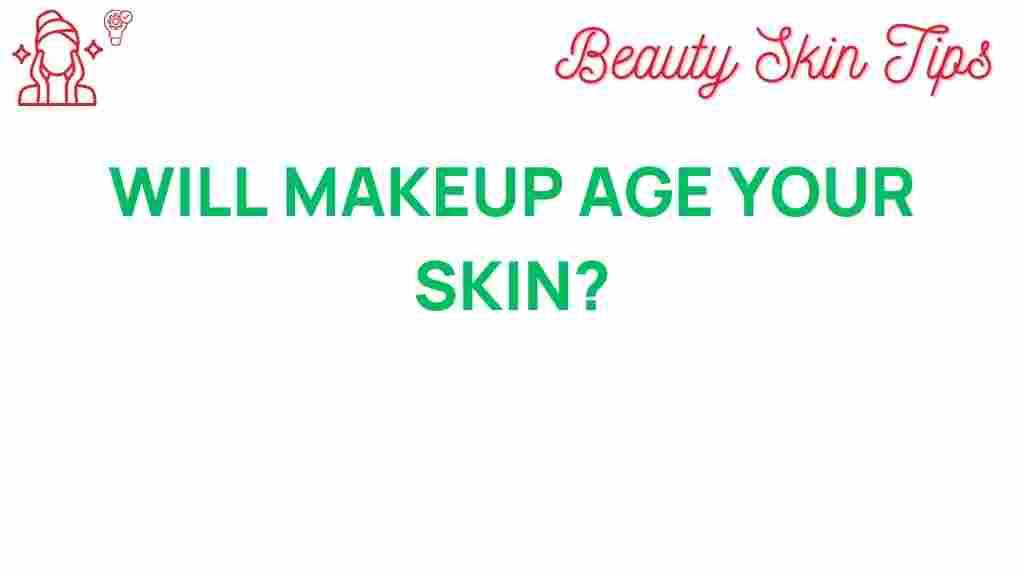Does Makeup Really Age Your Skin? Understanding the Impact of Makeup
Makeup has been a staple in beauty routines for centuries, allowing individuals to enhance their features and express their creativity. However, there’s an ongoing debate about whether makeup can actually age your skin. With the rise of social media and beauty influencers, this question has gained significant traction. In this article, we’ll explore the truth behind makeup and its potential effects on skin aging, providing you with a comprehensive understanding of how to maintain youthful skin while enjoying your favorite beauty products.
The Science of Skin Aging
To understand if makeup really ages your skin, it’s essential to first grasp the science behind skin aging. Skin aging is primarily influenced by two factors:
- Intrinsic Aging: This is the natural aging process that occurs as we age. Factors include genetics, hormonal changes, and internal body processes.
- Extrinsic Aging: This type of aging is influenced by external factors such as sun exposure, pollution, lifestyle choices, and yes, makeup.
While intrinsic aging is inevitable, understanding and managing extrinsic aging can significantly impact the appearance of your skin.
How Makeup Affects Your Skin
Makeup itself does not inherently age the skin, but certain factors surrounding its use can contribute to premature aging. Here are some ways makeup can affect your skin health:
- Clogged Pores: Heavy makeup can clog pores, leading to breakouts and inflammation, which can eventually damage skin elasticity.
- Dryness: Some makeup products contain alcohol or other drying agents that can strip moisture from your skin, leading to a dull appearance.
- Oxidative Stress: Certain makeup ingredients can lead to oxidative stress when exposed to sunlight, contributing to skin aging.
- Improper Removal: Failing to properly remove makeup can accelerate skin aging by allowing dirt and bacteria to accumulate, leading to premature wrinkles.
Choosing the Right Makeup Products
When considering how makeup impacts your skin, the choice of products is crucial. Here are some tips for selecting makeup that minimizes aging effects:
- Opt for Non-Comedogenic Products: These products are specifically designed not to clog pores.
- Choose Hydrating Formulas: Look for foundations and concealers that contain moisturizing ingredients such as hyaluronic acid or glycerin.
- Avoid Harsh Chemicals: Steer clear of products that contain parabens, sulfates, or fragrances that can irritate the skin.
- Use Mineral Makeup: Mineral-based makeup is often gentler on the skin and can provide a natural finish.
Makeup Application Techniques
How you apply makeup can also influence its impact on your skin. Consider these application techniques to reduce potential aging effects:
- Prep Your Skin: Always start with a clean, moisturized face. Use a primer to create a barrier between your skin and makeup.
- Apply Light Layers: Instead of heavy layers of makeup, opt for light, buildable products that allow your skin to breathe.
- Use Clean Brushes: Dirty brushes can harbor bacteria that lead to breakouts. Clean your makeup brushes regularly to maintain skin health.
- Pat, Don’t Rub: When applying products, use a gentle patting motion rather than rubbing, which can pull at the skin.
Step-by-Step Guide to Safe Makeup Use
To ensure that your makeup routine is not contributing to skin aging, follow this step-by-step guide:
- Cleanse: Start with a gentle cleanser to remove any impurities from your skin.
- Moisturize: Apply a suitable moisturizer to hydrate your skin.
- Prime: Use a primer to create a smooth base for your makeup.
- Apply Makeup: Choose non-comedogenic makeup products and apply them in thin layers.
- Remove Makeup: At the end of the day, use a proper makeup remover or cleansing oil to thoroughly cleanse your skin.
- Hydrate Overnight: Apply a nourishing night cream to restore moisture while you sleep.
Common Makeup Mistakes that Contribute to Aging
Even with the best intentions, some makeup habits can lead to skin aging. Here are some common mistakes to avoid:
- Skipping Sunscreen: Always apply sunscreen, even if your makeup contains SPF. Make it a part of your daily routine.
- Overusing Powder Products: Too much powder can settle into fine lines and accentuate wrinkles.
- Neglecting Skin Care: Makeup should complement your skincare routine, not replace it. Prioritize skin health above all.
Troubleshooting Makeup-Related Skin Issues
If you notice that your skin is showing signs of aging or irritation, consider these troubleshooting tips:
- Assess Your Products: Review the ingredients in your makeup and skincare products. Switch to gentler alternatives if necessary.
- Monitor Skin Reactions: Pay attention to how your skin reacts to specific products. If irritation occurs, discontinue use immediately.
- Consult a Dermatologist: If you experience persistent skin issues, consult a skincare professional for tailored advice and solutions.
Conclusion: Embracing Makeup Without Compromising Skin Health
In conclusion, makeup itself does not directly age your skin, but certain practices and product choices can contribute to skin aging. By selecting the right products, adopting proper application techniques, and maintaining a diligent skincare routine, you can enjoy the benefits of makeup while preserving your skin’s youthful appearance. Remember, skincare is the foundation of beauty, and healthy skin will always be in style.
For more tips on skincare and makeup, check out this comprehensive guide to achieving a flawless look. And for a deeper understanding of skincare science, visit this informative article.
This article is in the category Skincare and created by BeautySkinTips Team
